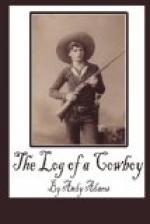Quince Forrest, who had brought in his horse to go out with the second watch, he and Bob Blades having taken advantage of the foreman’s absence to change places on guard for the night, had been listening to the latter part of Wyatt’s yarn very attentively. We all hoped that he would mount and ride out to the herd, for though he was a good story-teller and meaty with personal experiences, where he thought they would pass muster he was inclined to overcolor his statements. We usually gave him respectful attention, but were frequently compelled to regard him as a cheerful, harmless liar. So when he showed no disposition to go, we knew we were in for one from him.
“When I was boss bull-whacker,” he began, “for a big army sutler at Fort Concho, I used to make two round trips a month with my train. It was a hundred miles to wagon from the freight point where we got our supplies. I had ten teams, six and seven yoke to the team, and trail wagons to each. I was furnished a night herder and a cook, saddle horses for both night herder and myself. You hear me, it was a slam up fine layout. We could handle three or four tons to the team, and with the whole train we could chamber two car loads of anything. One day we were nearing the fort with a mixed cargo of freight, when a messenger came out and met us with an order from the sutler. He wanted us to make the fort that night and unload. The mail buckboard had reported us to the sutler as camped out back on a little creek about ten miles. We were always entitled to a day to unload and drive back to camp, which gave us good grass for the oxen, but under the orders the whips popped merrily that afternoon, and when they all got well strung out, I rode in ahead, to see what was up. Well, it seems that four companies of infantry from Fort McKavett, which were out for field practice, were going to be brought into this post to be paid three months’ wages. This, with the troops stationed at Concho, would turn loose quite a wad of money. The sutler called me into his office when I reached the fort, and when he had produced a black bottle used for cutting the alkali in your drinking water, he said, ’Jack,’—he called me Jack; my full name is John Quincy Forrest,—’Jack, can you make the round trip, and bring in two cars of bottled beer that will be on the track waiting for you, and get back by pay day, the 10th?’
“I figured the time in my mind; it was twelve days.
“’There’s five extra in it for each man for the trip, and I’ll make it right with you,’ he added, as he noticed my hesitation, though I was only making a mental calculation.
“‘Why, certainly, Captain,’ I said. ’What’s that fable about the jack rabbit and the land tarrapin?’ He didn’t know and I didn’t either, so I said to illustrate the point: ’Put your freight on a bull train, and it always goes through on time. A race horse can’t beat an ox on a hundred miles and repeat to a freight wagon.’ Well, we unloaded before




